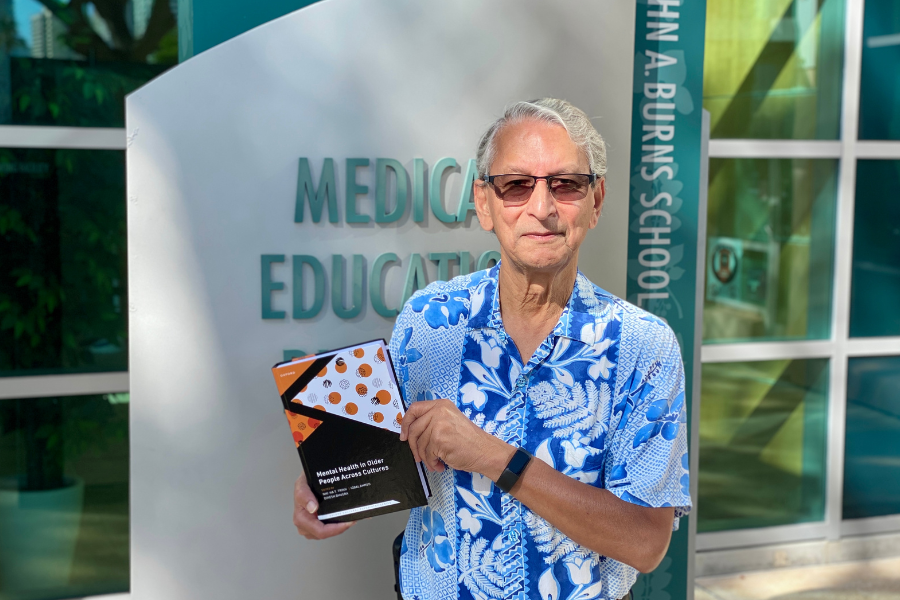
"Mental Health in Older People Across Cultures" is the new textbook authored by Dr. Iqbal Ahmed, a Clinical Professor of Psychiatry and Geriatric Medicine at the John A. Burns School of Medicine. Dr. Ahmed's textbook is timely as Hawaiʻi has one of the fastest-aging populations in the country. We sat down to learn more about the book and what medical students, practicing physicians, and even members of the general public can learn from it.
Q: You've summarized "Mental Health in Older People Across Cultures" as a global psychiatry book. How did this come about?
A: This textbook goes beyond culture to discuss socioeconomic factors and social determinants of health across all continents impacting the mental health of older adults, as well as how these impact the diagnosis and treatment of mental health disorders in different parts of the world. We cover issues in Europe, North America, South America, Africa, the Middle East, East Asia, and South Asia and highlight indigenous people. Our goal was to provide a global perspective on aging.
Q: More than 100 authors are contributing to this global psychiatry book. What avenues did they explore?
A: We have authors from different regions exploring cultural and socioeconomic factors and the unique challenges with aging and mental health. When we are born, we are all similar, but our lives and the aging process are shaped by the environments we grew up in, including some of the cultures we live in. So we wanted a book with that perspective because, as far I'm aware, no book has looked at it so broadly and globally. We look at the cultural factors and explore the commonalities and differences across cultures. We also realize that cultures are embedded in different countries with differing socioeconomic factors. There are unique challenges in each area. There are also marginalized people in every culture and country. We have this larger perspective in the first part of the book. The second part of the book explores different mental health disorders of older adults and how the different disorders may manifest themselves in different parts of the world as how they are evaluated and treated, including the role of stigma, family and other care giving issues, and access to care.
Q: As you explored culture by culture, can you give an example of our differences in mental health?
A: The systems of care across the globe are obviously different. There's more universal access to care in some places, like parts of Europe, even in Japan. In high-resource countries, people live longer. For example, we see this in Japan, parts of Europe, and North America. However, we could do better in the U.S. for sure because we have access to care issues even though we have Medicare for older adults. We also learned there are other differences, for example, in the rates of dementia across the globe and differences in how long people live. In parts of Africa and other developing regions, people don't live as long. Even in India, where I come from originally, people don't live as long as they do in the U.S. The prevalence of dementia is higher in places where people live longer, and access to care remains a challenge.
Q: Who's the audience for your textbook? Will it be used in undergraduate studies?
A: This is not really a traditional textbook. It's been written for all people interested in aging, and in the care of older adults. The book has been written in such a way that it'll be useful for physicians who are involved in the care of older adults or any other healthcare providers, including nurses, psychologists, social workers, and other mental health professionals. We wanted it to be useful for anybody interested in the mental health of older adults. We hope there is useful information here, for clinicians, educators, policy makers, as well as for laypeople.
Q: So this could be a resource book?
A: Yes. It can be used by those who want to do their own research or for teaching, so it's not necessarily meant for undergraduate or graduate students. It'll be useful in any of those settings, including medical school. Medical students, residents and fellows who are interested in geriatric medicine and geriatric psychiatry, as well as people involved in nursing and social work, will find it useful. We tried to make it as data-rich as possible.
Q: As conversations around mental health continue to be emphasized and as the world's population continues to age, hopefully, your book will be the first step toward more research in this area. What's next for you?
A: Our hope as authors is to have a global dialogue about the unique challenges of our older population. Hawaiʻi has a very large older adult population. We've 21% of the population being older adults compared to about 18% of continental US, which is only about 18%, whereas in Japan, it is much more. There are a lot of differences across the nations, but globally the world's older adult population is something like 800 million. In the U.S., we are over 60 million. The world population is rapidly aging and we all will be dealing with it. It's considered one of the global megatrends by the World Health Organization. I also want to emphasize that in under-resourced countries, the number of older people to younger people is shifting. There will be a limited amount of resources for that aging population because there are not enough people working to provide resources. So, it can create a generational conflict. So this is becoming a significant issue we have to face across the globe. In addition, we also need to talk more about healthspan rather than just lifespan. I urge people to think in these terms and I hope people who are involved in public policy will have a look at the book as we raise some of these issues.